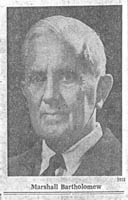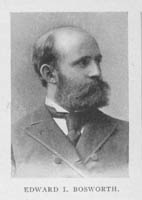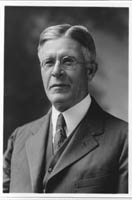Table of Contents
Key Figures
YMCA Secretaries
a | b | c | d | e | f | g | h | j | k | l | m | n-o | p | r | s | t-u | v | w | y-z
Ferdinand Barth
A Swiss YMCA Secretary, Barth volunteered for War Prisoners' Aid service in Austria-Hungary with the World's Alliance. Barth received his assignment in September 1918, shortly before the collapse of the Austro-Hungarian fronts in the Balkans and Italy and the Dual Monarchy's subsequent armistice with the Allies.
Marshall Moore Bartholomew (1885-1978)
Bartholomew served as an American YMCA Field Secretary during World War I. While in Germany in the Fall of 1915, he inspected the prison camps at Göttingen and Hannoverisch-Münden and gained first hand knowledge on how the American YMCA secretaries had developed War Prisoners' Aid operations. He then proceeded to Russia, where he remained until 1917. He began WPA operations in Irkutsk in Siberia in 1915 and conducted relief work until April 1916. He traveled to the United States during the Summer of 1916, but returned to Petrograd in the Fall of 1916. He proceeded to Vladivostok in March 1917 to conduct WPA operations in the Russian Far East. After the United States entered the war, he became the Director of the Music Bureau for the National War Work Council. Bartholomew was the Director of the Yale Glee Club from 1921 to 1953 and became an Associate Professor of Music at Yale University.
Clarence W. Bartz
An American YMCA secretary, Bartz volunteered to serve Allied prisoners of war as a WPA Secretary in Austria-Hungary. He arrived in the Dual Monarchy in October 1916 and worked at the prison camps at Braunau-in-Böhmen, Josefstadt, and Millowitz in Bohemia. At Braunau, Bartz set up a special education program for the thousands of boys incarcerated in Austrian prison camps. When it became clear in April 1917 that relations between the United States and Austria-Hungary would be severed, Bartz offered to remain as an enemy alien to continue WPA work in a prison camp. The Association did not accept his proposal, although Bartz did remain a few weeks after most of the other American WPA Secretaries left to maintain correspondence with Associations in prison camps and keep them running.
Pierre de Bennoit
A leader in the Swiss Student Christian Movement, de Bennoit was active in the World's Student Christian Federation (WSCF). He accompanied John R. Mott to Japan in 1907 to participate in the WSCF Conference in Tokyo. After World War I erupted, de Bennoit traveled to Berlin to meet with Mott, Karl Fries, and Hermann Rutgers in October 1914. These Y leaders met with members of the German National YMCA Association to determine how neutral Associations could best assist young men in Germany. They visited wounded soldiers in military hospitals and Allied POW's in German prison camps.
Pastor Berlin
By 1915, the National Committee of the German YMCA established a Prisoner of War Committee to provide relief services to Allied POW's in German prison camps. Pastor Berlin served as the Vice President of this committee.
Thorlief Boman
The Norwegian National YMCA Council sent Boman to Germany in March 1918 to work as a World's Alliance WPA Secretary. Conrad Hoffman assigned Boman to work with Allied prisoners in the XI Army Corps, based in Cassel, in central Germany. Boman was one of the neutral replacements for the American WPA Secretaries who left the Reich in February 1917.
Edward Increase Bosworth (1861-1927)
An American theologian and educator, Bosworth was a professor at Oberlin College and strongly supported the development of the American YMCA. Bosworth received a Bachelor of Divinity degree at Oberlin College in 1886 and completed graduate degrees at Oberlin, the University of Leipzig, and the University of Athens. He became the pastor of the Congregational Church in Mt. Vernon, Ohio. Bosworth joined the faculty at Oberlin College in 1887 to teach a new English Bible course and rose in rank to become the Chair of New Testament Languages and Literature in the Graduate School of Theology in 1892. He wrote extensively on prayer, Christian theology, and the life of St. Paul during his tenure. Several of his books became standard texts for the YMCA including Studies in the Acts and Epistles (1898), Studies in the Teaching of Jesus and His Apostles (1901), Studies in the Life of Jesus Christ (1904), and the very popular Christ in Everyday Life (1910). Many of his works became popular readings in Association circles, both in the United States and overseas. Bosworth was active in the World Student Christian Federation and attended the conference in Constantinople in 1911. In response to World War I, Bosworth wrote The Christian Witness in War in 1917. He served as the Dean of the Graduate School of Theology from 1903 to 1923 and as acting President of Oberlin from 1918 to 1919.
M. Bowen
An American doctor, Bowen served as the President of the Board of Managers for the YMCA in Constantinople during World War I. As tensions between the Association and the Turkish government began to grow as the conflict progressed, the YMCA had to reappraise its situation. The Turks sought the YMCA building for a police headquarters and U.S. Ambassador Henry Morgenthau recommended that the Association take action to prevent the confiscation of the facility. In December 1915, the YMCA created a new Board of Directors, which included Bowen, four other Americans, and three Germans. While they considered the establishment of War Prisoners' Aid relief services for Allied POW's in the Ottoman Empire, they finally decided to close the Constantinople Association building. They instead opted to lease the facility to the Dutch government as an annex to supply Allied prisoners with relief packets.
Joseph Brenning
Sent by the Swedish National YMCA to work in Germany, Brenning became a World's Alliance WPA Secretary around November 1917 and was one of the neutral secretaries who replaced the American WPA workers who left Germany in February 1917. Brenning conducted POW relief operations primarily in Silesia, working out of Breslau. His area of operations included prison camps in the V Army Corps (Posen), VI Army Corps (Breslau), and occasionally in the IV Army Corps (Magdeburg). In March 1918, the Association reassigned Brenning to serve Central Power POW's in Russia and he worked in prison camps in Turkmenistan.
Fletcher Sims Brockman (1867-1944)
Brockman served as the Associate General Secretary of the International Committee of the American YMCA during World War I. Brockman began his service with the YMCA in 1898, establishing an Association in Nanking, China. He was in China during the Boxer Rebellion and had to flee with his family during the anti-foreigner uprising. From 1901 to 1915, Brockman was the General Secretary (National Secretary) of the Chinese YMCA Movement. In 1915, John R. Mott recalled Brockman to New York, where he became the Associate General Secretary of the National War Work Council and Associate General Secretary of the International Committee. Brockman acted as a general assistant to Mott during the war. He served until 1924 when he returned to China for six months. From 1924 to 1929, Brockman was the Administrative Secretary in the Far East for the Foreign Committee of the National Council of YMCA's of the USA. He retired from Association work in 1929.
Axel Busch
A member of the Danish National YMCA, Busch volunteered to serve as a World's Alliance WPA Secretary in Austria-Hungary after American WPA Secretaries left the Dual Monarchy in April 1917. Busch began operations in Hungary in August 1917 and worked at the prison camps at Somorja and Zalägerszeg until the end of the war.


